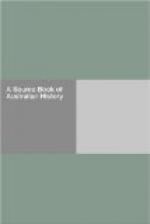Full Reports by Mail.
TELEGRAMS FROM MELBOURNE
Melb. 14th Jan.
Appropriation Bill was rejected by Legislative Council consequent upon clause for payment of members being inserted. Government in Council dismissed at a moment’s notice all County Court Judges, Police Magistrates, Wardens, Coroners, many Heads of Departments. Further sweeping changes announced. Great Alarm and Indignation. Trade disorganised.
25th Jan.
No political change. Many more dismissals.
30th Jan.
Eminent Counsel declare Acts of Sir George Bowen in closing Courts illegal. The country alarmed. Secretary of State urged to await letters by mail and not act on exparte statements.
To the Right Hon. Sir Michael Hicks-Beach, Bart, M.P.
Government House, Melb. April 12th, 1878.
Sir,
On the 29th ultimo I forwarded to you a telegram announcing the happy termination, through a fair compromise honourable to both sides, of the protracted crisis and “deadlock” between the two Houses of Parliament, which had caused so much excitement and agitation, and so much suffering and loss in this community, and which was straining the constitution of this Colony to a degree which it could not have endured for long.
Ever since December constant efforts have been made to induce the conflicting Houses to agree to an honourable compromise of their differences. Personally I omitted no proper opportunity of recommending mutual forbearance and mutual concessions. It was proposed on behalf of the Ministry and the Assembly that the Council should agree to pass the separate Bill sent up to them in December, and that the assembly should simultaneously, or as nearly so as might be, appoint a Committee to search for the Appropriation Bill which had been “laid aside” and should then reenact that Bill without the item objected to by the Upper House. The Ministers, a strong minority of the Councillors, the Assembly, and the general public—all united in pressing the Council to accept this arrangement, but there were many disappointing delays and failures in the negotiations.
Finally, however, all difficulties were overcome, and both the separate Bill continuing the reimbursement of the expense of members and the annual Appropriation Act have become law.
General satisfaction has been felt and everywhere expressed at this termination of the late dangerous and disastrous parliamentary “deadlock,” and the political and social animosities caused by it are already fast subsiding. The country is tranquil and generally prosperous. Before the commencement of the political crisis there had been a partial depression in trade and depreciation in the value of certain kinds of property, in consequence of a long drought succeeded by very heavy floods, and from other temporary causes. These evils had been aggravated by the sense of uncertainty rather than of insecurity produced by the fierce and protracted political and social agitation and antagonism of the last four months. But a young and strong community like that of Victoria, full of life and energy, and of that general good humour which flows from the habitual prosperity of all classes, rapidly recovers from depression and discontent, however caused.




